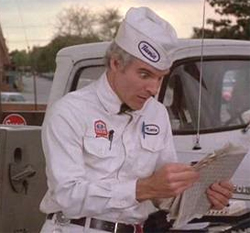The Darker Side of Corporations “Getting Social”
You’re going to miss 2010.
In five years we’ll look back and realize that this was a simpler day. A lack of established business models and rules gave some the belief that a free Hootsuite account, a mantra of “Just do it” and being “open and authentic” would make them a social media ninja.
By 2015, people will already look back at 2010 as a “digital love-in” with the nostalgia that aging hippies harbor for the ’60s. So much was just about to change, and nobody imagined the digital horizon was about to be turned upside down.
In 2015, being socially unlisted will be a status symbol
 At first social media looked like a pathway to “hyper-empowered” consumers. That’s because consumers were first movers in social media. As they connected to each other and shared knowledge, they found a new source of power
At first social media looked like a pathway to “hyper-empowered” consumers. That’s because consumers were first movers in social media. As they connected to each other and shared knowledge, they found a new source of power
But once firms started to connect and share their views of the social grid, their superior analytic horsepower began to turn the tables on consumers. Phone companies use network analysis of who you speak to, as social networks turn into data maps of association, and location-aware phones tell advertisers which displays slowed you in their stores. Suddenly, automation, analytics and lots of available personal data produced “hyper-empowered” marketers.
Once firms can map who really brings friends with them when they change accounts or promote causes, a new set of social media scores will became as important and formalized as credit scores. Chris Selland describes this in his post on how Klout Score is the start of corporate profiling of customers, just as FICO credit scores are used to understand credit history. Chris says there’s a business opportunity, but its not what today’s social zealots think it is.
It may have once been liberating to think of “brand YOU”. But once firms can calculate the exact value of your brand to them, they can judge consumers, and to some degree make being their promoter part of your relationship to them. The self-objectifying scoring of social media is training a generation to buy and sell their own bodies by the pound. The game is fun, until everyone’s in on it.
In 2015 Social Media Will Hardly Be Personal
 As social media is professionalized, it will also become depersonalized. By 2015 everyone will know that digital lives are performances. By then, it will seem ludicrous that real athletic or entertainment performers would be personally using social media to connect with fans, any more than they connect with fans call-in programs.
As social media is professionalized, it will also become depersonalized. By 2015 everyone will know that digital lives are performances. By then, it will seem ludicrous that real athletic or entertainment performers would be personally using social media to connect with fans, any more than they connect with fans call-in programs.
Sure you can “talk with Shaq” on Twitter. But to work at scale, everyone will know this is a digital characterization, same as when we “talk” online with the Cookie Monster or the King from Burger King.
Naturally, as social media becomes less personal, corporations will be more at home with it. Social media was once the way that geeks could bypass customer service and get to “a person.” Far before 2015, social media will be just one more incoming line of contact, and you’ll get the same staff that you’d reach through the 800 line. Just as VPs don’t answer many service lines today, they won’t be picking up on social media mentions. There will be a team for that, and what management needs to know will roll-up to a dashboard.
Yep, tie dyes, leisure suits, and button-downs each had their day. The same is true of technology trends. The dot.com smugfest gave way to a crop of “social media ninjas.” But 2010 is when corporations started to operationalize social meda, and use this new channel with skill. That’s a good thing, but its a sign of a maturing space where experts will increasingly have real experience, and hiring managers won’t look to social media gasbags to tell them about openness or to think like publishers.
In fact, it’s 2011 and these old saws already seem kind of quaint. Do you think social media is starting to show its age? Though media never dies, neither does new media stay new indefinitely.

 The future of digital experiences will be built by strategists who grasp the full array of emerging business, social, and technical models. Specialties in user experience, branding, application design, and data science are laying the foundation for richer user experiences and business models breakthrough products and revenue based marketing.
The future of digital experiences will be built by strategists who grasp the full array of emerging business, social, and technical models. Specialties in user experience, branding, application design, and data science are laying the foundation for richer user experiences and business models breakthrough products and revenue based marketing.
10 Responses to "The Darker Side of Corporations “Getting Social”"
January 25, 2011
Maybe nobody will notice or care that they’ve just become a commodity among commodities.
You may be right in saying that in a few years the only way to not conform will be to ‘unplug’. But will it really be possible…?
January 25, 2011
Dave, I think you are spot on! In fact, I think it has already started. If companies talk to their customers (and I mean really ‘talk’ as in person-to-person) they’ll hear the rumblings of the rebellion. I am hearing things like “all this ‘I’m the best; you’re the best; we’re the best” corporate chatter is making people feel like it is high school all over again where everyone wants to hang with the “cool kids”. The difference with the community using social media today is that they have the added perspective of knowing that “coolness” is short-lived and ultimately has little value. Remember, just like in the movies/life, the guy who really gets all the attention is the one who is just a little different than everyone else (think leather jacket and motorcycle),shuns the attention, and influences subtly…
January 25, 2011
[…] This post was mentioned on Twitter by JibbaJabbaPods and Mauro Cardarelli, Dave Wieneke. Dave Wieneke said: New Post: Will being socially unlisted become a status symbol? http://bit.ly/fJAVqp #socialmedia #140conf #privacy […]
January 25, 2011
Literally Minded asks “what if nobody minds being a commodity among commodities?” My friend, Derek Showerman, used to go on about how marketing teaches humans to be “commerce cows”. To aspire to the same houses made by Rubbermaid(tm), to enjoy the same entertainment, and have the same media stoked dreams. That makes those of us willing to go against the game and risk taking a header that much more crazy or rare. Contrarian investments are where big wins come from — perhaps the same is true of people.
January 25, 2011
[…] friend Dave Wienecki reminded me of something I have thought a great deal about, but never put into print. It is about […]
January 27, 2011
In my social circle, it’s already this way. None of us have ever been on Facebook, Myspace, LinkdIn, or anything else that can monitor your network, market to you, invade your privacy or sell your personal info. We all learned from the days of catalogues that once you voluntarily give your personal info to a corporation, they will pimp it out. No thank you!
February 1, 2011
Social media began as a place to connect with family and friends. Then companies joined in and it got more “corporate”. There is only so much “corporate” that can be handled by the masses. By 2015, likely there will be some cool new tool until that goes corporate and the cycle continues. Companies will always jump aboard what’s “hot”.
February 7, 2011
Dave – the paragraph that stuck with me most was: “Naturally, as social media becomes less personal, corporations will be more at home with it. Social media was once the way that geeks could bypass customer service and get to “a person.” Far before 2015, social media will be just one more incoming line of contact, and you’ll get the same staff that you’d reach through the 800 line. Just as VPs don’t answer many service lines today, they won’t be picking up on social media mentions.” (I couldn’t edit it down! Too many great points).
Pretty soon a post to “@So_and_so_Corp” will be nothing other than another way to reach the generally inept operators that you get through any other “first line filtering” system. I think the best and most “real” conversations will come from individuals and SMBs, who still have stake in their markets and businesses. Maybe this will be a good thing — leave the “little people” to idea-share, troubleshoot, and create in these spaces!
March 22, 2011
Nice Picture man!
March 7, 2012
Can being socially unlisted still be a status symbol if there’s no society who knows about it?